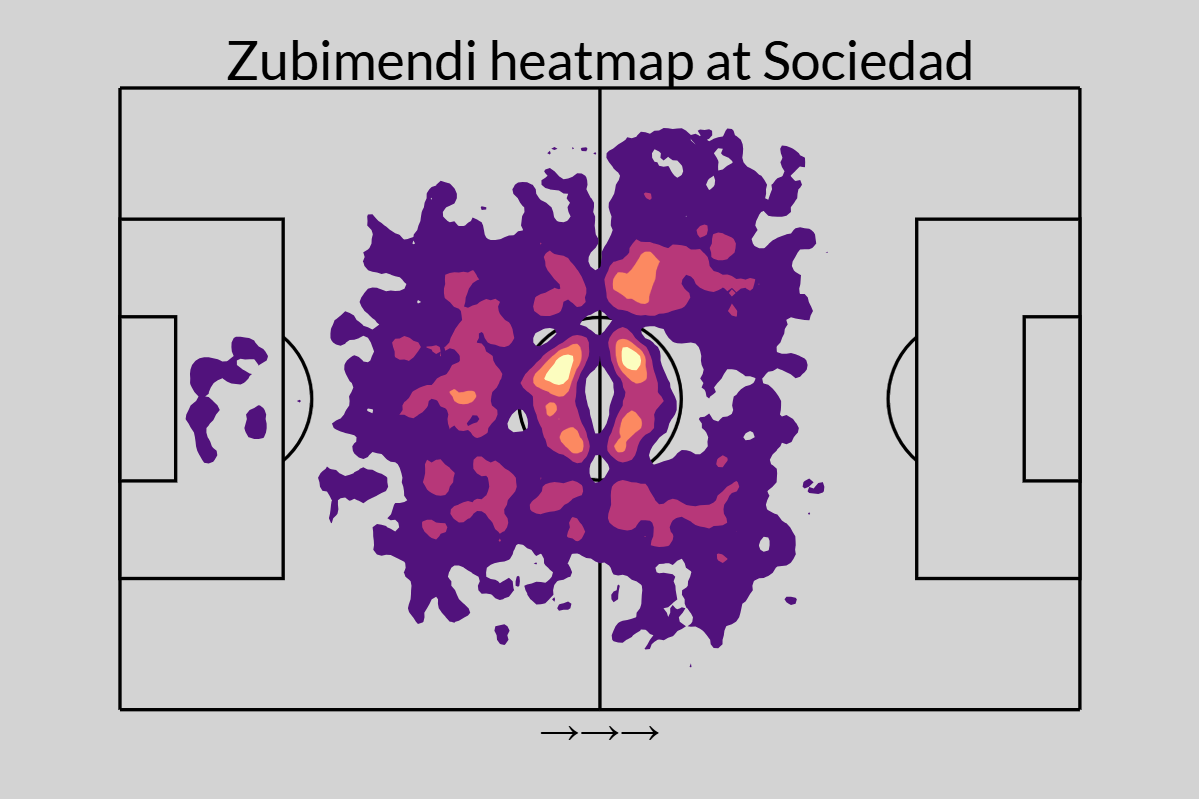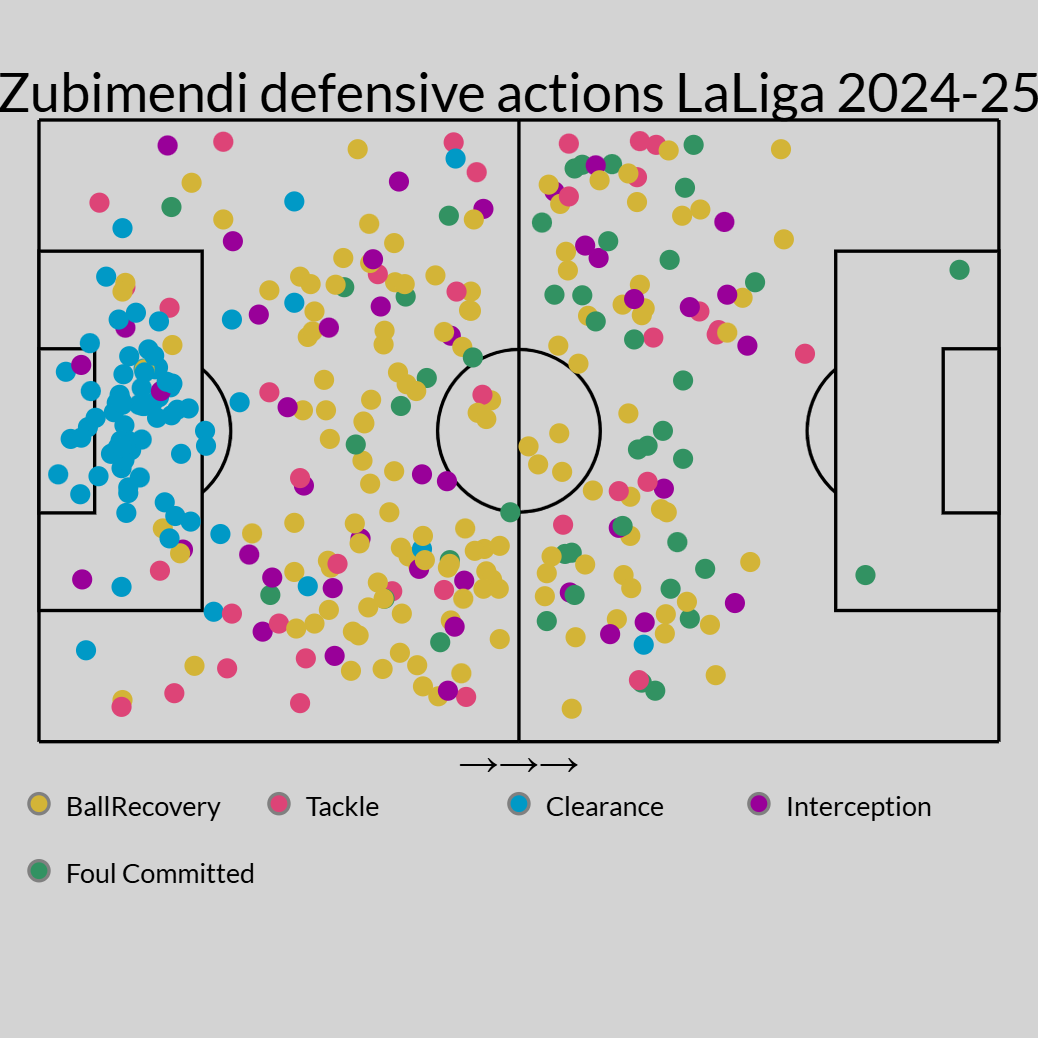In an age when young players are often transferred between clubs before finding their feet, Martín Zubimendi's trajectory at Real Sociedad offers a refreshing exception. The defensive midfielder joined the Basque side's academy at the age of 12 and rose through the ranks, making his LaLiga debut at 20 in a 2-1 home victory over Getafe on April 25, 2019.
It took three more years before Zubimendi fully established himself as a mainstay in the Real Sociedad starting XI and his initial breakthrough came courtesy of injuries to Asier Illarramendi. As a result, Zubimendi honed his craft in the No. 6 role under the guidance of Real Sociedad B head coach, and master of the trade himself, Xabi Alonso.
Now a full Spain international with nearly 250 official matches for his club, Zubimendi has spoken frequently of Alonso's influence, crediting the former Liverpool and Real Madrid midfielder with shaping his understanding of the deep-lying playmaker position. But instead of moving to Real Madrid to reunite with Alonso, he has chosen another former Spain midfielder, Mikel Arteta, to take charge of his career after completing a €60 million move to Arsenal.
Position
Operating primarily as a traditional No. 6, ahead of the defence and behind the more attacking-minded midfielders, Zubimendi's influence is felt in both phases of play. Off the ball, he brings positional discipline and defensive balance, shielding his centre-backs and anticipating danger.
In possession, he acts as the focal point of Real Sociedad's buildup play, typically dictating tempo with his passing, whether threading the ball through the opposition line or switching play to the flanks.
Under Real Sociedad boss Imanol Alguacil, who left the club in May, Zubimendi was most often deployed as a lone pivot in a 4-1-4-1 or 4-3-3 system. However, earlier in his career (and even occasionally more recently) he has featured alongside a second holding midfielder. In such setups, he is afforded more attacking freedom, adopting a role that more closely resembles a box-to-box No. 8, with more license to roam.
His tactical intelligence and reliability have also earned him trust at the international level for Luis de la Fuente's Spain. Zubimendi has stepped into a similar role -- alternating as a single/double pivot -- with Rodri absent through injury, and played a key part in the country's Euro 2024 and UEFA Nations League triumphs.
Strengths
Branding Zubimendi merely a "tactical player" would undersell his broader skill set. While his understanding of the game is undoubtedly sharp, he also boasts a range of technical qualities that are immediately apparent on the ball. He may not dominate any statistical category from an analytics perspective, but what sets him apart from his peers is his all-around excellence and the ability to perform a wide variety of tasks at a consistently high level.
Zubimendi's standout quality is his ability to deliver rapidly executed, accurate passes under pressure. It stems from a strong first touch, fine body control -- allowing him to turn fluidly in either direction -- and an excellent understanding of his teammates' attacking movements. With a clear picture of his next pass in his mind before even receiving the ball, he keeps possession ticking over and ensures attacking patterns continue without disrupting the flow. Indeed, his stabilizing presence in midfield is tailor-made for teams built around dominance and possession.

Creatively, his contributions are less about headline-grabbing assists and more about continuity. As a holding midfielder, his value lies in short, incisive passes that help untangle jammed areas, evade pressure and maintain rhythm, rather than unlocking defences. Even so, especially when deployed in a double pivot, there's been a gradual increase in both line-breaking passes and runs, hinting at the capability for a broader creative range.
Out of possession, Zubimendi has impressed for his exceptional reading of the game and impressive positional sense. He plays with a quiet intensity, constantly scanning for danger and adjusting his movement to anticipate opposition transitions, and, even in what has been a relatively disappointing campaign by Real Sociedad's recent standards, he is still one of LaLiga's most effective midfielders when it comes to interceptions and tackles.
He makes quick decisions and has the capacity to shift rapidly into pressing mode, though he does so without unnecessary aggression: averaging just 1.1 fouls per 90 minutes (fine for a defensive midfielder) and boasting a respectable disciplinary record in that he has never been sent off in his senior career. Though committing the occasional calculated tactical foul is also an aspect of his game.

How he can improve
While Zubimendi ranks among the elite in his role as a classic holding midfielder, primarily focused on distribution and defensive duties, there is still room for growth in terms of progressive and key passes, even if that's not the main reason Arsenal have signed him.
As with any newcomer to the Premier League, he will need to adapt to the physicality, transitional nature and relentless tempo of English football. But, given his wealth of experience at both club and international level, there's little reason to doubt his ability to cope after an initial period of adjustment.
Who else were linked?
Liverpool's interest in Zubimendi last summer -- which ultimately ended with the midfielder opting to remain at Real Sociedad -- was well-documented. A potential move to Manchester City was also floated in the media, with Zubimendi mentioned as a possible understudy to Rodri.
A potential move to Real Madrid was also reported, especially with Alonso taking over, while Bayern Munich were reported to have monitored his situation closely as part of their broader midfield rebuild.
How will he fit at Arsenal?
All the key ingredients for Zubimendi to thrive at Arsenal are firmly in place. From a purely footballing perspective, he has proved himself at the highest level as a European champion with Spain and consistent performer in LaLiga.
At 26, he arrives with maturity and clarity of purpose, not as a developing player, and his role is well-defined. He will provide a strategic, protective presence at the base of midfield, freeing up the likes of Declan Rice to push forward, in a possession-heavy side with occasional bursts of directness. The fact that he's also accustomed to playing as a single pivot gives Arteta the option of fielding a "double No. 8" of Rice and Martin Ødegaard.
And then there's the cultural fit. Under Arteta, he will be not only working with a fellow Spaniard, but a fellow Basque -- a factor that should eliminate any potential language barriers or misalignments in tactical understanding.
